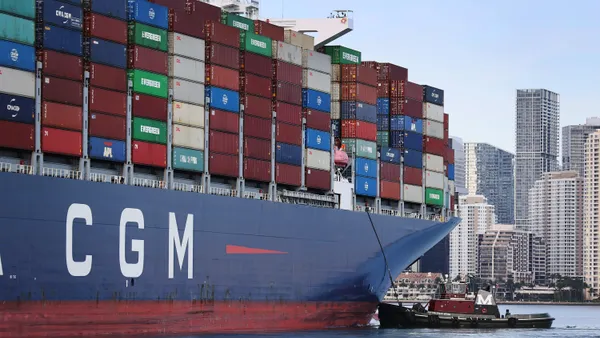Dive Brief:
- FedEx announced it will not levy additional residential delivery surcharges during peak season (Oct. 21, 2019 through Jan. 5, 2020), according to a press release. However, customers can expect rate and surcharge increases across FedEx Express, FedEx Ground, FedEx Freight and all its subsidiaries effective Jan. 6, 2020.
- The rates are set to increase between 4.9% and 5.9% depending on the shipping option selected. The increases to the various surcharges vary by type and Delivery Area Surcharge ZIP codes are expected to change as of Jan. 6 as well.
- FedEx went through a similar process during peak season in 2018, not applying residential surcharges during peak season, but raising overall rates by 3.5% to 4.9% (depending on the shipping option) in January 2019.
Dive Insight:
Heading into the end of the year it's not unexpected to see announcements of rate increases from carriers and logistics providers.
UPS announced it would not be applying additional residential delivery surcharges this peak season, but has yet to announce general rate increases for 2020. After peak season 2018, UPS announced general rate increases of 5.9% that went into effect Feb. 18, 2019.
"One thing is certain – FedEx is hitting large packages where it hurts," Matthew White, a strategist at iDrive Logistics, told Supply Chain Dive via email. Based on the data currently available on FedEx's website, the impact of the rate and surcharge increases together could represent as much as a 12% cost increase to ship packages weighing over 50 pounds, according to iDrive Logistics' analysis.
As logistics companies deal with higher parcel volume as a result of e-commerce they're hiking prices for larger packages as a way of managing available space. The United States Postal Service announced price changes earlier this summer that lowered the volume requirement for being considered a large package.
While FedEx has raised rates year over year, the uptick in percentage increase for 2020 prices may be driven by several factors. Analysts will watch FedEx closely this peak season to chart how it fares after cutting ties with Amazon earlier this summer, choosing to go after the broader e-commerce parcel market.













